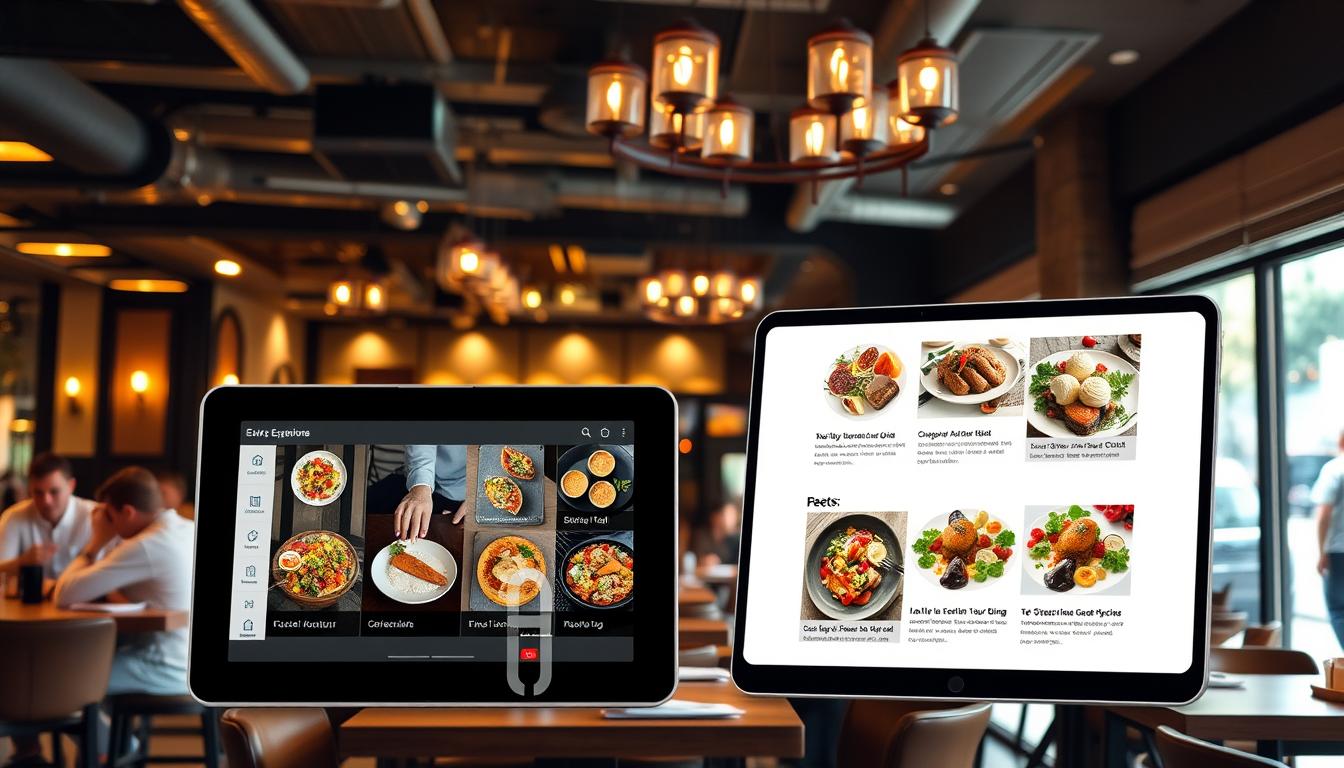In today’s digital world, many restaurants struggle to be seen online. They often ignore important parts of search engine optimization (SEO)1. This includes technical, off-page, and local SEO, which are just as vital as on-page SEO1.
Many website builders don’t offer enough tools for SEO. This makes it hard to have a complete SEO plan1. To really shine, you need to cover all bases of SEO1.
This guide will show you how to use these strategies to your advantage. By learning about keyword research and a full SEO approach, you can get more people to visit your restaurant online123.
Importance of Keyword Research
Effective keyword research boosts a restaurant’s SEO, making it more visible online and attracting more customers4. By exploring keyword research, we find ways to connect with our audience. Tools like Google Keyword Planner and Ahrefs help us find popular terms in the restaurant industry4.
It’s key to understand the search intent behind these keywords. This lets us create content that really speaks to our audience.
Understanding Search Intent
Short-tail keywords, like “running shoes,” get a lot of searches, like 165,0005. Long-tail keywords are more specific and draw a targeted crowd to our site5. By studying search intent, we match our keywords with content that meets user needs, whether for info, a transaction, or a specific location5.
Benefits of Keyword Research
Investing in keyword research brings many SEO benefits, like more traffic generation and better audience targeting4. Using local SEO, like location-based keywords and a current Google My Business profile, is key for local customers4. Quality backlinks from trusted sites also boost our Google rankings4.
By focusing on keywords with high search volume and low competition, we increase our online presence4.
Keeping an eye on food blogs, social media, and forums helps us spot trending keywords in the food world4. Using these insights, we can make content that speaks to our audience and boosts traffic generation to our site4.
On-Page SEO Essentials
Boosting your restaurant’s online presence starts with on-page SEO. This part of SEO makes your web pages rank higher and attract more visitors6. By using the right on-page SEO, more people can find your restaurant when they search online.
Key on-page SEO elements include content optimization and title tags. Also, header tags, internal linking, and image optimization are important6. A good URL structure and high-quality content are also crucial. These help search engines understand your website better, improving your ranking.
We start by finding the right keywords for your restaurant6. Use these keywords in your website’s titles, headings, and text6. Also, make sure your URLs are clear and include your keywords.
Having a mobile-friendly website is also key6. More people use their phones to search for restaurants. A fast, easy-to-use mobile site can boost your rankings6. Using schema markup can also highlight your website in search results.
By using these on-page SEO strategies, you can set your restaurant up for success online6. Keep an eye on your site’s performance and update it regularly. This will help you stay visible and attract more customers.
“Optimizing your on-page SEO is like building a sturdy foundation for your restaurant’s online presence – it’s the essential first step towards achieving lasting digital success.”
Technical SEO Foundations
As restaurant owners, it’s key to grasp the basics of technical SEO. This ensures our site is easy for search engines to find and use. Technical SEO deals with the site’s backend, helping search engines crawl, index, and get our content7.
Site speed is a big deal in technical SEO. Fast sites keep users engaged and boost sales8. Making our site load quicker improves both user experience and search rankings.
Mobile-friendliness is also vital. Over 80% of people use mobiles to surf the web8. Our site must be easy to use on mobiles. Google now favors mobile-friendly sites, pushing others down in search results8.
Setting up XML sitemaps and robots.txt files is also key. They help search engines understand our site’s layout and content9. Using schema markup and fixing crawl errors also strengthens our site’s technical base.
By focusing on these technical SEO areas, we build a strong, user-friendly site. This boosts our search engine visibility789.
Off-Page SEO Strategies
As a restaurant owner, you know how vital a strong online presence is. On-page SEO is key, but off-page strategies can really help. Let’s look at the main tactics to boost your restaurant’s success.
Backlink Building
Getting quality backlinks from trusted sites can improve your restaurant’s online image and search rankings10. Building a variety of backlinks through guest posts, partnerships, and outreach can change the game. It’s also important to keep your NAP info consistent online to build trust10.
Social Media Marketing
Using social media is a great way to reach your audience and drive website traffic10. Being active on Facebook, Instagram, and Twitter lets you show off your brand and engage with customers. Working with food influencers can also boost your online presence and rankings10.
Listing on Google Business Profile and review sites like Yelp and TripAdvisor can increase your visibility10. Other platforms like Citysearch, Foursquare, and Yellowpages.com can also help attract new customers10.
A solid off-page SEO plan can unlock your restaurant’s digital potential11. By using these strategies, you can stand out and draw in more customers.
“Effective off-page SEO can transform your restaurant’s online presence, driving more customers and boosting your bottom line.”
Keyword Research for Restaurant
As restaurant owners, we know how key it is to draw in customers online. Keyword research helps us find the right words people search for. This way, we can make our restaurant more visible and attract more customers12.
Finding the right keywords means balancing search volume and competition. For example, ‘Restaurants Melbourne’ gets 12,100 searches a month but has low competition12. ‘Romantic restaurants in Melbourne’ gets 720 searches a month with low competition too12. Google Keyword Planner helps us see how many people search for these keywords and how competitive they are12.
It’s important to keep our keyword strategy consistent to avoid ranking poorly12. We should use keywords naturally in our content, not stuff them in12. Keeping our site fresh with new keywords helps Google see us as valuable12. Google Analytics lets us see which keywords bring people to our site, helping us improve12.
Good keyword research is the base of a strong restaurant SEO plan. By targeting the right keywords and keeping our content fresh, we can get more online visibility. This helps us connect with more potential customers and grow our business13.
| Keyword | Monthly Search Volume | Competition Level |
|---|---|---|
| Restaurants Melbourne | 12,100 | Low |
| Romantic restaurants in Melbourne | 720 | Low |
“SEO is highlighted as a cost-effective way for restaurants to promote their business online. Restaurants with high SEO are more likely to appear closer to the top of search engine results pages, increasing visibility and potential customer engagement.”13
Local SEO Tactics

Restaurant owners know how key it is to draw in local customers. Local SEO helps us do this by making our online presence more visible for people searching nearby. By using local SEO, we can better connect with our audience and meet their needs.
Google My Business optimization is a big part of local SEO. Claiming and verifying our Google My Business listing lets us share important details like our address and hours14. We can also add photos, reply to reviews, and show off our menu. This makes us more visible and trustworthy in local searches.
Using location-based keywords is another key tactic. By including terms like “[city/town] restaurants,” we make sure our content is relevant to locals15. Tools like Google Trends help us find the best keywords for our site and content.
Getting backlinks from local sites like community directories and blogs also boosts our SEO16. Plus, managing our online reviews and responding to feedback helps build trust and reputation. This is good for both search engines and potential customers.
By using these local SEO strategies, we can build a strong online presence that appeals to our local audience1415. Local SEO is a powerful way for restaurants to stand out and attract more customers from our community.
Content SEO Strategies
In the competitive world of the restaurant industry, content SEO is key. It drives organic traffic and attracts potential customers. By matching our content with what people search for, we offer a better experience. This experience is engaging and relevant, both for users and search engines17.
Keyword Targeting
Keyword research is the base of good content SEO. We find out what our target customers search for. This helps us rank higher in search results. We focus on long-tail keywords and phrases that sound like real speech, especially for voice search17.
It’s not just about the right keywords. We also need to understand what users want. By meeting those needs, we offer a better experience. Search engines reward us with better visibility and rankings.
Content Planning and Creation
With the right keywords and understanding of search intent, we plan our content. We create informative blog posts and a detailed online menu. We also optimize our Google Business Profile and use customer reviews18.
Quality and freshness are crucial in content SEO. As AI content grows, we focus on creating valuable, customer-focused content. Regular updates and optimizations keep our site relevant and performing well17.
A comprehensive content SEO strategy attracts our target audience and builds brand awareness. By using the right keywords, understanding search intent, and creating quality content, we succeed in restaurant marketing and SEO1718.
User Experience (UX) SEO

As restaurant owners, we know how vital a great customer experience is. This is true both in our restaurants and online. SEO is key, and UX is a big part of it. By making our website easy to use, fast, and accessible, we meet Google’s standards and keep our customers happy.
Easy website navigation is essential. It helps people find our menu, make reservations, and get other important info19. A clear site and clear calls-to-action make it easy for users to find what they need. This lowers bounce rates and boosts chances of them staying and ordering.
Page load speed is also crucial for a good user experience20. Fast page loads come from optimizing images, reducing redirects, and using caching. This keeps our customers interested and stops them from leaving our site.
In today’s world, having a mobile-friendly website is a must19. A good mobile experience means users can easily navigate and find what they need. This is especially important for people searching for restaurants on their phones.
Accessibility is also key in UX SEO. It makes sure our website is open to everyone, including those with disabilities20. Adding features like alt text and screen reader optimizations makes our site inclusive. This attracts a wider audience.
By improving user experience, we boost our website’s SEO and build a loyal customer base. This loyalty extends to both our online and in-person offerings.
Competitor Keyword Analysis
As restaurateurs, we know staying ahead is key. Analyzing our competitors’ keywords is a powerful way to do this21. By looking at their keywords, we can find insights to improve our SEO.
Search engines change often, focusing on user experience and content relevance21. We must keep up with these changes. By studying our competitors, we can find gaps in our strategy and new ways to reach our audience.
Short-tail keywords, like “restaurant,” have lots of searches but may not be as targeted21. Long-tail keywords, such as “best seafood restaurant in Vancouver,” have fewer searches but are more specific21. Looking at our competitors’ use of these keywords helps us create better content.
| Keyword Metric | Description |
|---|---|
| Search volume | Shows how popular keywords are and how many searches they get22. |
| Keyword difficulty | Tells us how hard it is to rank for certain keywords based on competition22. |
| Cost-per-click (CPC) | Highlights valuable keywords with high commercial intent in paid search22. |
| Site authority | Measured by backlinks, content quality, and user engagement, with higher authority leading to better rankings22. |
By looking at these metrics, we can understand our competitors’ strategies and find ways to outdo them22. This helps us find gaps in our strategy and make sure we’re not missing out on opportunities21.
Doing a thorough competitor keyword analysis is a smart move to get more organic traffic and beat our rivals23. By matching our content to what our audience wants and finding new keywords, we can boost our online presence and ensure our restaurant’s success.
SEO is always changing, with smarter algorithms and fiercer competition21. Keeping up with trends and refining our keyword research is crucial for staying ahead. With the right competitor keyword analysis, we can achieve lasting online success for our restaurant.
Conclusion
Mastering SEO for our restaurant’s online presence is more than just the basics24. We need to do deep keyword research, optimize our content and website, and use off-page and local SEO well. This way, we can get more people to see our restaurant and attract more customers25.
Keeping up with SEO is a never-ending job that needs our constant effort25. We must keep up with new SEO trends and best practices. This will help us keep improving our restaurant’s search engine ranking over time24.
By taking a full SEO approach, we can make our restaurant’s online presence better. We can give users a great experience and help our business grow and succeed2425. Remember, SEO is a powerful tool. When used right, it can help our restaurant reach its full potential online.
FAQ
What is the importance of keyword research for restaurant SEO?
What are the key elements of on-page SEO for restaurant websites?
What does technical SEO entail for restaurants?
How can restaurants leverage off-page SEO strategies?
What are the key aspects of local SEO for restaurant websites?
How can restaurants leverage content SEO strategies?
What user experience factors impact SEO for restaurants?
How can competitor keyword analysis benefit restaurant SEO?
Source Links
- https://thedigitalrestaurant.com/mastering-seo-for-restaurants/
- https://theorderguys.com/restaurant-seo/
- https://www.romainberg.com/blog/seo/restaurant-seo/
- https://www.digital-restaurant.co.uk/blog/effective-keyword-research-restaurant-seo-boost-restaurants-online-visibility/
- https://www.highervisibility.com/seo/learn/why-keyword-research-important-seo/
- https://www.digital-restaurant.co.uk/blog/use-page-seo-attract-diners-comprehensive-guide/
- https://www.mediasearchgroup.com/industries/seo-keywords-for-restaurants-businesses.php
- https://www.touchbistro.com/blog/restaurant-seo-tips/
- https://www.incentivio.com/blog-news-restaurant-industry/your-guide-on-restaurant-seo-to-increase-website-ranking
- https://www.searchenginejournal.com/off-page-seo-checklist-restaurants/443483/
- https://www.semrush.com/blog/restaurant-seo/
- https://blog.typsy.com/how-to-do-keyword-research-for-your-restaurant-website
- https://www.tryotter.com/en-gb/blog/restaurant-toolkit/restaurant-seo-keywords-guide
- https://www.webfx.com/industries/food-beverage/restaurants/local-seo/
- https://localiq.com/blog/local-keyword-research/
- https://www.upmenu.com/blog/local-seo-for-restaurants/
- https://www.tablecheck.com/en/blog/seo-strategies-for-restaurants-and-hotels-in-2024/
- https://hurrdatmarketing.com/seo-news/seo-for-restaurants/
- https://www.digital-restaurant.co.uk/blog/optimise-restaurants-website-local-search-key-strategies/
- https://www.adviso.ca/en/blog/guides-en/seo-ux-website-redesign/
- https://www.marketingillumination.com/blogs/competitor-keyword-analysis-techniques
- https://paradoxmarketing.io/capabilities/search-engine-optimization/insights/how-to-conduct-competitive-keyword-research/
- https://www.growthmachine.com/blog/how-to-outrank-the-competition-using-competitor-keywords
- https://seoforestaurants.com/local-keyword-research-for-restaurant/
- https://blinkco.io/blog/the-science-behind-search-unraveling-the-role-of-keywords-in-algorithms-and-how-they-increase-restaurant-traffic/


